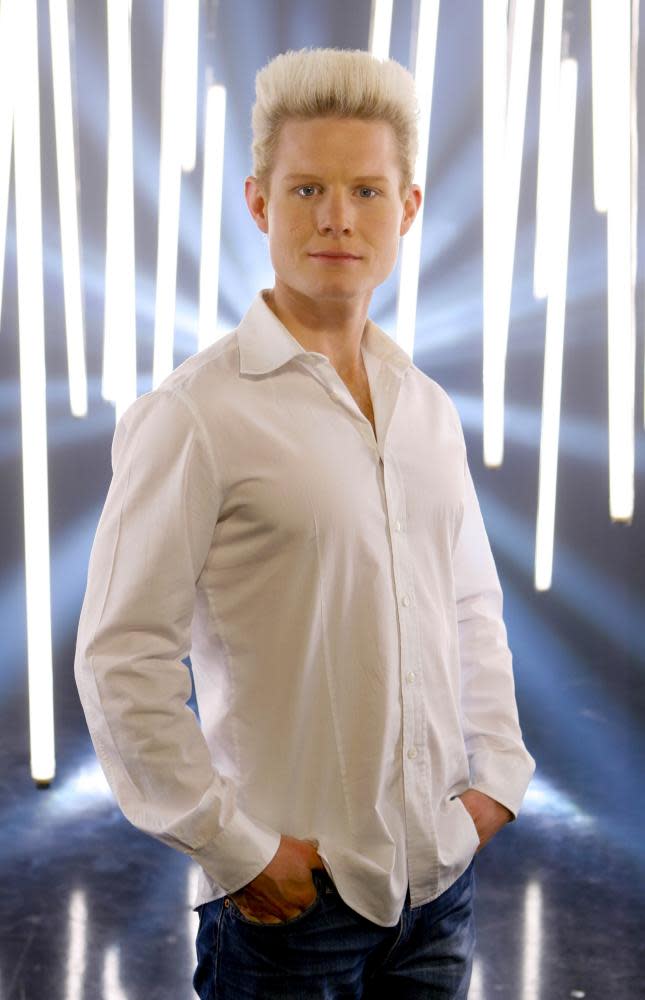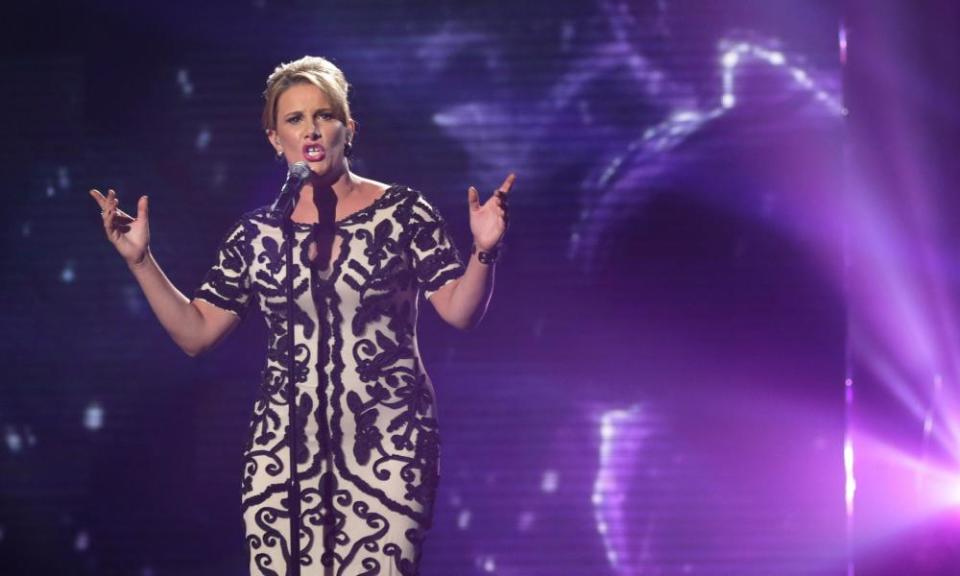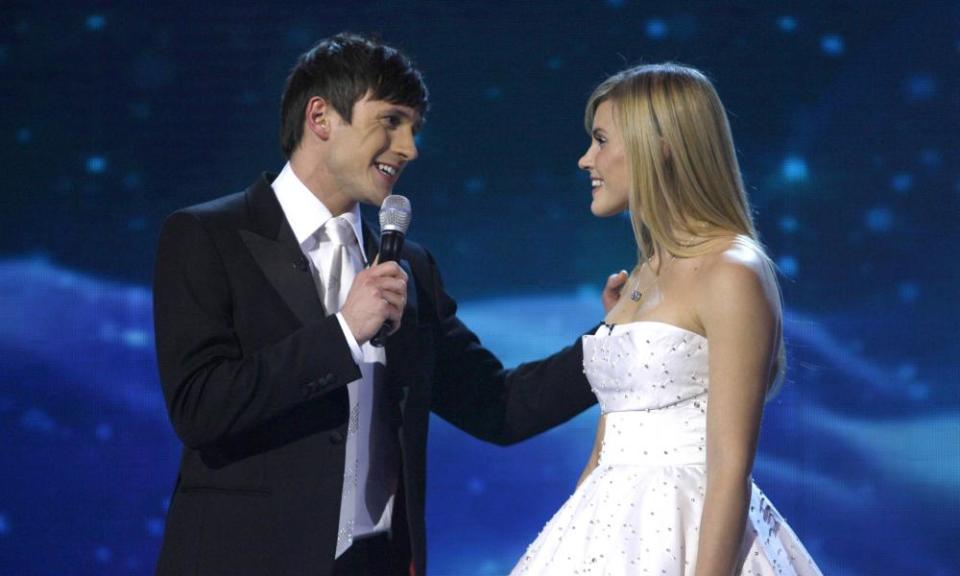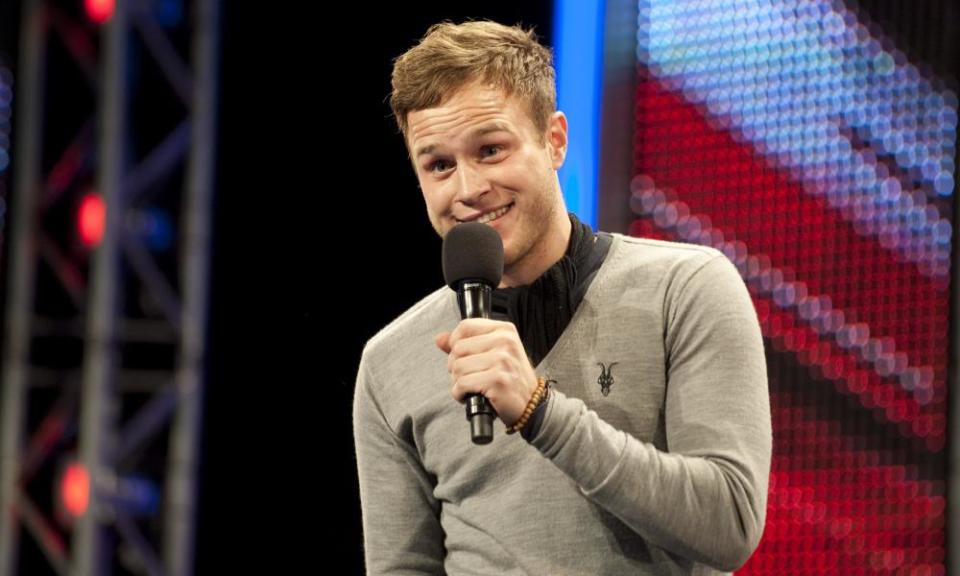The best X Factor finalists – ranked!

45. Nicholas McDonald
By series 10 in 2013, the once star-making talent show had started to eat itself, with man-child Nicholas McDonald being primed as the next Olly Murs. His earnest, screw-faced mugging on the show was followed by his woeful debut single, Answerphone, in which a prospective date correctly ignores the call.
44. Anthony Russell
Essentially a cypher for 2018 judge Louis Tomlinson, who wanted to remind people that despite once being in One Direction, he enjoys the music of Oasis and caging himself in outdated ideas of masculinity.
43. Eoghan Quigg
Poor cherubic Eoghan, he of the apparently impossible to pronounce first name (it’s actually just Owen). First, he was lumbered with Boyzone as his big collaboration in the final while eventual winner Alexandra Burke got to duet with Beyoncé, before his no-expense-spent 2009 self-titled album was roundly derided as the worst ever recorded.
42. Tabby Callaghan
Series one’s third placed “Tabby” (real name Trevor) was judge Sharon Osbourne’s TV talent show version of a proper rock star. This meant he had a feather-cut, wore eyeliner and sang songs by the likes of Bon Jovi and Extreme as if passing a large, jagged pebble.
41. Steve Brookstein
“He’s full of crap and he’s an average singer,” was Osbourne’s live summary of the first ever winner of The X Factor. Accurate.
40. Journey South

Brothers Carl and Andy Pemberton hit the middle-aged-mum demographic so expertly that their debut album should have come with a Boots voucher. Essentially two ageing boyband members bored of the pub circuit, their risk-free 2006 debut album of covers sold more than 200,000 copies in its first week.
39. Christopher Maloney
Big of voice and orange of skin, series nine bronze medallist Maloney seemed like the kind of person who would be fun on a work night out.
38. G4
Initially derided by Simon Cowell as “fat buskers”, perma-smiling opera-pop hybrid G4 finished runners-up in 2004. Cowell was clearly a fan of the genre: he had spent three years manufacturing Il Divo, whose debut album was released that same year and sold 1.5m in the UK.

37. Ben Mills
You remember Ben. He wore suit jackets and jeans. Your mum loved him. He had really, really great hair, like peak-Friends Jennifer Anniston.
36. Ben Haenow
“Haenow, Haenow, don’t dream it’s over.” And it was, depressingly quickly, as the ex-van driver and series 11 winner’s 2015 album limped into the charts at No 10. Two months later, he was dropped by record label Syco.
35. Rhydian Roberts
The theatrical Welsh baritone with the snow-white quiff, Roberts brought a well-needed sense of ridiculousness to a show that, post-Leona, was starting to believe its own hype. Fun fact: his 2008 self-titled debut album features a duet with John Travolta’s favourite singer ,“Adele Dazeem”, (AKA Idina Menzel).
34. Luke Friend
The spectre of Ed Sheeran’s busking days hovered over the perpetually earnest Luke Friend, who was unfortunately never too far away from the show’s new weapon in the authenticity wars: an acoustic guitar.
33. Leon Jackson
A year after Leona Lewis’s triumphant win gave the show a reason to exist, series four winner Leon Jackson arrived to remind people that mediocrity is never too far away. Memorable only for his inexplicable feathered mullet and slightly confused doe eyes.
32. Sam Bailey

Laugh all you want, but this ex-prison officer turned throaty ballad-destroyer supported the actual Beyoncé on her The Mrs Carter Show World Tour in 2014, the year she was crowned winner of series 10 (Bailey, that is, not Beyoncé). Let me repeat that: Sam Bailey has supported Beyoncé on tour.
31. Scarlett Lee
The X Factor loves a comeback narrative, and the big-voiced, big-haired Scarlett Lee has made it through to this year’s final despite the indignity of being eliminated during the show’s unnecessarily brutal six-chair challenge in 2017.
30. Ray Quinn
Merseyside’s answer to Robbie Williams doing big band, the bequiffed, former Brookside star Ray Quinn was completely overshadowed in series three by overwhelming favourite Leona Lewis. He has settled into comfortable C-list fame since – as well as numerous theatre roles and an upcoming part in Hollyoaks, he also won the fourth series of Dancing on Ice in 2009.
29. Kevin Davy White
Paris-based musician Kevin Davy White brought some class to last year’s series, often performing stripped back or rocked-up versions of songs while playing an instrument and wearing a hat.
28. Matt Terry
Matthew “Matt” Terry was notable for two things: a really impressive and versatile fringe, and being the second ever victor to release an original song as their winner’s single. Unfortunately, it was a depressing, Ed Sheeran-penned yuletide flop called When Christmas Comes Around.
27. Andrea Faustini
Italian Andrea charmed the judges with his impassioned singing, love of pugs and apparent inability to stop smiling. An early favourite to win series 11, he ended up in third place after his one-trick performance technique, shouting loudly while pacing up and down, grew a little old.
26. Ché Chesterman
The incredibly named Ché Chesterman was a fan of the backwards cap, Jessie J-style over-emoting and black-framed glasses. His “vintage” vocals were often in danger of imploding, allowing the show to insert its favourite cliffhanger: a trip to the throat doctor and the inevitable crowd-pleasing big note.
25. Grace Davies
Despite series nine’s Lucy Spraggan often performing original songs, it was series 14 where that became the norm, with both eventual winners Rak-Su and runner-up Grace Davies constantly churning out self-penned musings. Davies’s lovely ballad Too Young was a highlight, hampered slightly by her reliance on a mannered, overly breathy delivery.

24. Same Difference
Seven years after Steps called it a day for the first time, they were essentially reincarnated as this mildly terrifying brother-sister duo. Walsh famously hated them, probably for showing that pop can be fun, bright and throwaway and not just five identikit mannequins on stools.
23. Andy Abraham
Dubbed “the singing binman” by the tabloids, season two runner-up Andy Abraham seems like a bit of a throwback now – a nice man using his nice voice to sing some nice covers while wearing a nice suit. Quite nice.
22. Dalton Harris
The favourite for this year’s crown, Jamaican Dalton Harris comes with a proper reality TV-ready journey that involves poverty, determination and a sense of destiny. He can also, you know, sing really well, too.
21. Reggie ‘n’ Bollie
Reggie Zippy and Bollie Babeface (yes, amazing) had one trick and one trick only: mashing up unlikely pop songs with dancehall or reggae anthems, typically involving Fuse ODG, to create something unexpectedly entertaining. Obviously, once the show was over no one cared, but that is so often the brutal truth of The X Factor.
20. Matt Cardle
After an admittedly lovely rendition of The First Time Ever I Saw Your Face at boot camp, everyman Matt Cardle locked the mum vote to win series seven, despite being up against One Direction and Rebecca Ferguson, and almost being vaporised by Rihanna’s star quality during a hilariously mismatched duet in the final. Has gone on to enjoy a smattering of success, including a recent top 20 duet with Mel C.
19. 5 After Midnight
The X Factor has never really had a close relationship with the idea of cool, with the promising trio 5 After Midnight – whose audition performance of Drake’s One Dance has 3.5m views on YouTube – eventually reduced to cringing their way through awful mashups decided by Louis Walsh.
18. Saara Aalto
Often decked out in what looked like the dregs of a Lady Gaga garage sale, Finland’s Saara Aalto married lung-busting vocals with a knowing sense of camp. Unsurprisingly, she has represented Finland at Eurovision on three separate occasions, most recently this May. She finished second last.
17. Marcus Collins
Eight series in and The X Factor had found its groove, pairing big pop acts with retro-tinged soul singers who harked back to the so-called good old days. Liverpool’s talented Marcus Collins fit the latter brief, eventually hemmed in by 60s doo-wop stylings that saw him release a “unique” take on Seven Nation Army. Jack White probably hated it, which only makes it better.
16. Jahméne Douglas
Best known for having his microphone swiped out of his hand by mentor Nicole Scherzinger during the 2012 final, Jahméne brought an understated soulfulness to proceedings despite looking like he might cry at any moment.
15. James Arthur

Series nine winner Arthur has had a rocky relationship with The X Factor. In 2012, he released the biggest-selling winner’s single, Impossible, but was later dropped after using homophobic slurs in some, erm, battle raps. In 2016, he returned with new teeth and a new record deal, later scoring a UK No 1 with Say You Won’t Let Go. He’s also the owner of some truly awful tattoos.
14. Stacey Solomon
Yes, it’s a singing competition, blah blah blah, but The X Factor is also about entertainment, or it certainly used to be. That was epitomised by series six finalist Solomon, whose nice-enough performances were merely a taster for the often hilarious chatty bits afterwards.
13. Amelia Lily
When Frankie Cocozza, AKA a child’s doodle of Pete Doherty, was booted off the live shows in series eight, it set the scene for the glorious return of Middlesbrough’s own Kelly Clarkson, Amelia Lily, who had been voted out in week one. A third-place finish was followed by one excellent single, the Xenomania-produced You Bring Me Joy.
12. Louisa Johnson
Pity poor Louisa Johnson, who became the first X Factor winner to be signed and then dropped without releasing an album, despite scoring two top 10 singles and releasing the actually very good Best Behaviour in 2017. This year’s Dirrty-esque Yes was her make-or-break single, eventually peaking at 65.
11. Rak-Su
The jury’s still out on boyband Rak-Su, who lit up last year’s series with a combination of self-penned bangers and a reliance on Sweet Female Attitude’s 2000 garage anthem Flowers. Rather than capitalise immediately on the R&B-meets-afrobeats domination, they seem to have waited too long, with September’s Adina Howard-sampling I Want You to Freak stalling at 39.

10. Fleur East
A contestant on this year’s I’m a Celebrity ... , Fleur East was electrifying the X Factor in 2014 with a thrilling version of Mark Ronson’s Uptown Funk, in which she broke the TV talent show mould by singing and dancing simultaneously. The following year’s energetic Sax showed promise, but she was dropped in 2017.
9. Shayne Ward
After series one winner Steve Brookstein flopped, a lot was riding on Shayne Ward’s broad shoulders. Primed as the UK’s answer to Justin Timberlake (he had a buzz cut), his debut single, That’s My Goal, shifted a million copies. The Max Martin co-penned If That’s OK With You, released in 2007, still bangs.
8. Joe McElderry
There was something uncomplicated about little Joe McElderry, a young man your nan would love, who just enjoyed having a nice singsong. The end. His debut single proper, an unexpected cover of Norwegian band Donkeyboy’s hi-energy Ambitions, would be his last visit to the UK Top 10.
7. Rebecca Ferguson
Mixing crippling nerves with a rich, velvety voice, series seven runner-up Rebecca Ferguson was ripe for a proper X Factor journey. Her debut album, Heaven, set out her stall as the next Duffy or, everyone hoped, the new Adele; all vintage soul and Radio 2-ready drivetime emotions.
6. Olly Murs

You get the feeling Olly Murs didn’t expect to have just released his sixth top two album in a row. Originally a hat-favouring placeholder for Robbie Williams as his career recovered after releasing Rudebox, Murs has gone on to mix a handful of effervescent bops with a smattering of just-above-average.
5. JLS
The first X Factor boyband to really make their mark, finishing second in series five, JLS paired pectoral scraping T-shirts and Zumba-class-ready choreography with ludicrous dance-pop (The Club is Alive) and OTT ballads (Love You More). Extra marks for Aston Merrygold’s backflips, too.
4. Alexandra Burke
OK.com, here’s an opinion for you: Alexandra Burke deserved more. She could sing, she could dance, she held herself like a pop star, she snotted all over Beyoncé during the live final and, in Bad Boys, she had a proper, undeniable banger. Her second album, released in 2012, was appalling.
3. Leona Lewis
If we are talking pure talent, then there can be only one winner. Leona Lewis’s honeyed vocals saw her win series three by a country mile, before 2007’s immaculate Bleeding Love turned her into a global superstar. But it couldn’t last, with a dip in song quality revealing the vacuum where a personality was supposed to be.

2. One Direction
It’s weird to think that One Direction, a global phenomenon who reshaped popular culture, didn’t win their series, finishing third behind Rebecca Ferguson and Matt Cardle. Perfect debut single What Makes You Beautiful set them on a journey that involved ludicrous merch opportunities, some lovely haircuts and the sense that by the end, they were pulling in different, erm, directions.
1. Little Mix
Girlbands had had a torrid time on The X Factor (Bad Lashes anyone?) to the point where Little Mix, then called Rhythmix, had to convince the sceptical producers to put them through to the live shows in the first place. Fused together from four failed solo auditions, Jade, Perrie, Leigh-Anne and Jesy continued to prove people wrong, quickly looking like a proper girlband, while also maintaining individual identities. They have also, so far, managed to sidestep the typical girlband trait of diminishing returns, with 2016’s bop-heavy fourth album Glory Days shifting more than a million copies in the UK.

 Yahoo News
Yahoo News 